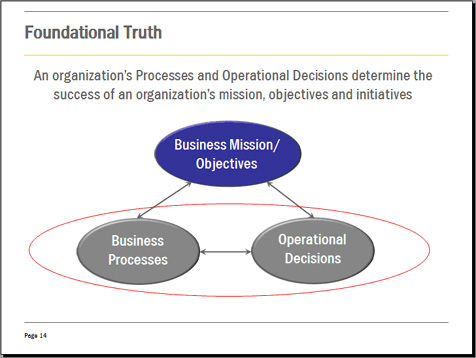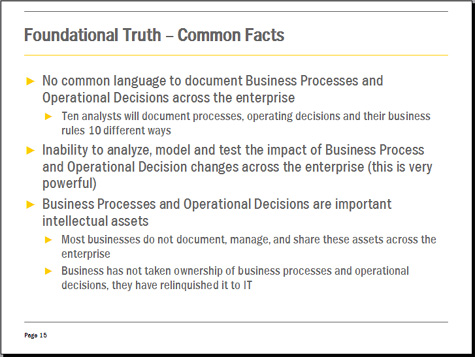So, you have just returned from a great conference where you learned that BPM (business process management and BDM (business decision management) will address many of the issues you face within your company. You now have the proof, from the experiences of other companies, as to how these methodologies can benefit your company. You’re so excited over the opportunity to make real difference in your organization. You share your excitement with a few co-workers but quickly realize that getting upper management to buy into this newfound methodology may be harder than you think. In fact, since you’re not a member of senior management, you begin to wonder why they would listen to you.
When I returned to work after learning about BDM and BPM, I quickly discovered that selling this was going to be harder than I thought. In fact, the first person I relayed my excitement to was my boss and he threw a cold towel on me. I was shocked. In my eyes, BDM/BPM would address significant problems that we were experiencing, but he could not connect this opportunity to the problems that he was currently facing. I realized that getting him and other members of senior management to understand how BDM/BPM would address their problems was going to take more than my excitement and a few conversations. This article is dedicated to those who see the benefits these methodologies posses, but don’t know how to convince management or have tried and failed.
I would like to share a few tips, techniques and best practices from my experience with evangelizing BDM and BPM within a very large organization. I recommend that you take my input and adapt it to fit your organization’s situation.
Build a business case:
The first thing you should do is build a business case in the form of a presentation. Your business case will address the problem, the solution, case studies, and the value proposition to your company. My presentations always start with the following two slides and then I walk them through a case study that paints a clear picture of how another organization benefited.
 Figure 1
Figure 1

Figure 2
The point of the first slide is to show that an organizations’ mission, objectives, customer treatment, customer expectations, employee opinions, etc… are only fulfilled by two things, 1) an organization’s processes and 2) the daily operating decisions (automated and not automated).
The second slide brings home the painful truth that we’re handicapped because we don’t have a common language to document them, model them, and manage them as assets. This is the foundation I build on. The rest of the presentation walks the audience through the problems this causes, solutions, case studies and next steps. By the way, I have yet to have any participants try to refute this universal truth. They connect with this truth very quickly.
Before you give your business case to your senior management, practice on as many friendly co-workers, at as many levels, as you can. Every time you give the presentation, listen carefully to the feedback. If you have missed the mark in any way, they will usually tell you what to change in your presentation. Be patient, don’t be defensive and listen. Also, everyone who listens and buys into your business case can help you. They can be your eyes and ears to look for problems that your solution can solve.
I actually created two presentations, one for senior management and another for those who roll-up their sleeves and do the daily work. I did this because the problems that each of these groups face and their vocabulary are often different.
Developing a clear, focused, on-point presentation is an iterative process. Plan for this and don’t shortcut the time needed to do it right.
Become an evangelist:
My experience with promoting BPM and BDM has taught me to become an evangelical sales person. You may say to yourself, “why should I become a sales person, I’m in technology and I don’t have any sales training, and in fact, I have no interest in becoming sales person?” The reality is, regardless of your position, all of us must learn to sell our ideas in order to be successful. If you’re convinced of the value this offers, go for it and don’t become discouraged with a few setbacks. Learning sales skills will make your more valuable and successful in your career. You can do it!
Commitment and tenacity:
When you make your presentation, be prepared for answers such as: “I see value, but I don’t know how to get senior management to buy into it.”, or “How are you going to get the business to take ownership of the processes and operating decisions?” or “This is a good idea, but we have to spend our time on bigger problems.” You may just get a flat out “No.” The toughest part of receiving rejections is that, in actuality, they don’t see that this methodology would solve many of their problems.
The first thing to remember is that a No is not a No. When you make a presentation, listen carefully to input or pushback and ask questions. You may find that the individuals you are presenting to do not have the ability to influence management or perhaps your presentation did not connect clearly to their problems. You may find your audience agrees with you, but they are not willing to be a leader and push it forward. Use this feedback to improve your business case and presentation techniques. I wound up rewriting my business case several times.
To be successful, you must have commitment and tenacity, and not allow others to discourage you. There will be bumps and twists in the road so be ready for them.
It takes time:
While you may have quickly understood the value of these methodologies, do not expect others to see the light so clearly. This is especially true because BDM is a disruptive invention. Remember, implementing this methodology is a process; it normally does not happen overnight. Commit yourself to the long term and don’t get discouraged if short term results are not fruitful.
You don’t always have to ask permission:
If you have the ability to implement BDM and BPM into a project and you don’t have to ask permission, go for it! Instead of getting permission, you identify some low hanging fruit and move forward. Take small calculated steps.
I did this and it was very beneficial. I received push back from some of my team members but once they saw the value they became very resistant to returning to the old ways. I then documented the results and added them as a case study to my business case presentation. This turned out to be very powerful!
I have found that it was much easier to get those who roll-up their sleeves and perform the daily work to understand and buy into the value than senior management. Senior management often views the organization’s key issues different from the middle to lower ranks. This does not mean that they don’t get it, but it does mean that you have to present your case from their point of view. I have consistently found that senior management will understand the value proposition quickly when I make it relevant to their views, vision and offer tangible answers.
You may be asking yourself why I should go to all this work, effort and possible rejections. If you do not try, you have already failed. If you try, you have the opportunity to succeed. No matter what happens, enjoy the journey. You will learn a lot and become a more valuable person in your organization.

















